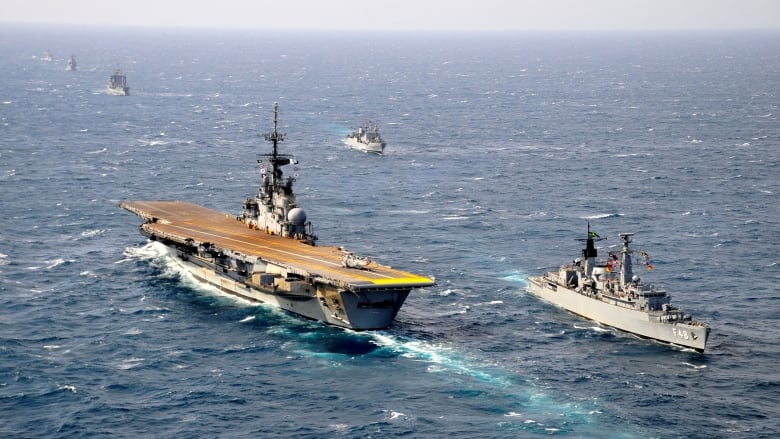This article is more than
1 year oldBrazil sinks rusting aircraft carrier in Atlantic despite pollution concerns

Navy bought French-made carrier in the 1990s, but needed refit didn't happen
Brazil sank a decommissioned aircraft carrier in the Atlantic Ocean off its northeast coast, the Brazilian navy said, despite warnings from environmentalists that the rusting 1960s French-built ship would pollute the sea and the marine food chain.
The 32,000-tonne carrier had been floating offshore for three months since Turkey refused it entry to be scrapped there because it was an environmental hazard, and the ship was towed back to Brazil.
The carrier was scuttled in a "planned and controlled sinking" late on Friday, the navy said in a statement, that would "avoid logistical, operational, environmental and economic losses to the Brazilian state."
The hull of the Sao Paulo was sunk in Brazilian jurisdictional waters 350 kilometres off the coast where the sea is 5,000 metres deep, a location chosen to mitigate the impact on fishing and ecosystems, the navy said.
Tonnes of asbestos present
Federal public prosecutors and Greenpeace had asked the Brazilian government to stop the sinking, saying it was "toxic" due to dangerous materials, including nine tonnes of asbestos used in panelling.
"The sinking of the aircraft carrier Sao Paulo throws tons of asbestos, mercury, lead and other highly toxic substances into the seabed," Greenpeace said in a statement. It accused Brazil's navy of neglecting the protection of the oceans.

The Clemenceau-class aircraft carrier served the French navy for four decades as the Foch, capable of carrying 40 war planes.
Defence expert and former foreign policy congressional staffer Pepe Rezende said the carrier was bought by the Brazilian navy for just $12 million US in 1998 but needed an $80-million refit that was never done.
After the carrier was decommissioned, a Turkish marine recycling company bought the hull for $10.5 million but had to tow it back across the Atlantic when Turkey barred entry to its shipyard.
Banned from Brazilian ports
Brazil's navy said it asked the company to repair the carrier at a Brazilian shipyard, but after an inspection showed it to be taking on water and was at risk of sinking, the navy banned the ship from entering Brazilian ports. It then decided to sink the Sao Paulo at high sea.
The company's legal representative in Brazil, Zilan Costa e Silva, said that disposal of the carrier was the Brazilian state's responsibility under the 1989 Basel Convention on the trans-boundary movement of hazardous wastes.

Greenpeace said the sinking violated the Basel Convention, the London Convention on the prevention of marine pollution and the Stockholm Convention on persistent organic pollutants.
"The Brazilian navy chose to harm the environment and lose millions of dollars rather than allow public inspection of the ship," Greenpeace said, calling the sinking the "biggest breach of chemical and waste agreements ever committed by a country."
Keywords

Newer articles
<p>Diddy's homes were recently raided in Los Angeles and Miami by Homeland Security.</p>
India calls for ‘immediate de-escalation’ amid Israel-Iran tensions
Why Israel is risking a dramatic escalation with Iran
Iron Dome, David’s Sling, Arrow: Israel’s air defense against Iran, explained
Israel’s War Leaders Don’t Trust One Another
OJ Simpson to be cremated and no plans to donate brain to science, lawyer says
Bianca Censori stuns in extreme v-neck dress
US helped Israel take down ‘nearly all’ Iranian drones and missiles – Biden
‘Their tactics have changed’: Russia’s bid to blow apart Ukraine’s power grid
Russia's meat grinder soldiers - 50,000 confirmed dead



